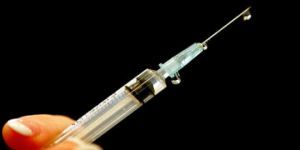Injectable Drug Aveed Approved by FDA for Treatment of Adult Men with Low-T
Aveed (testosterone undecanoate), an injection drug designed to combat hypogonadism, has been approved by the FDA after being rejected 3 times.

Endo Pharmaceuticals Inc. announced its hypogonadism drug, Aveed (testosterone undecanoate), has been approved by the US Food and Drug Administration (FDA). This low-testosterone injection was rejected by the FDA 3 times, most recently in May 2013, but has now been accepted.
The FDA stated they “had carefully considered the recommendations of the joint advisory committee and approved Aveed with a boxed warning to inform healthcare professionals about the risks of serious [pulmonary oil microembolism] POME and anaphylaxis.” The product will only be available for men whose benefits of taking the drug outweigh the risks, ensured through the risk evaluation and mitigation strategy (REMS) distribution method.
Aveed is a prescription designed to produce serum testosterone levels in the normal range after initial injection by a doctor or clinic, again at 4 weeks, and at 10 weeks thereafter.
The most common side effects of Aveed are acne, pain at injection site, increased prostate specific antigen (an early indicator of prostate cancer), increased estradiol level, low testosterone level, tiredness, irritability, increased red blood cell count, difficulty sleeping, and mood swings. Other side effects include long-lasting erections, lung problems, allergic reactions, enlargement of prostate glands,ankles, feet, body, or breasts, risk of prostate cancer, liver problems, decreased sperm count, liver problems, sleep apnea, or blood clots in the legs.
The FDA originally noted their concern about side effects after the use of Aveed, which include castor oil formation in the blood vessels and lungs. A consumer advocacy group also expressed the need for low-t drugs to warn users of the risks of heart problems. The FDA said they do not have evidence suggesting cardiovascular risks associated with Aveed, but they are reviewing all relevant data.